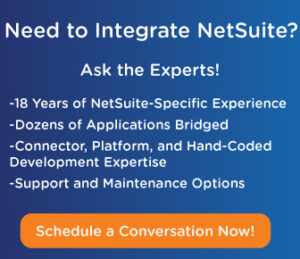- CALL : (+1) 407-273-1001
- Main Office : (+1) 407-273-1001
- Enterprise Integration NetSuite NetSuite Integration
- Feb 06
- 4 mins read
NetSuite Integration: The Ultimate Guide to Understanding Your Options!

NetSuite Integration Options
So you need an integration? You’re not alone. New technology is emerging daily and keeping your IT portfolio integrated is an on-going struggle. That being said, integrating NetSuite is not something that should be taken lightly. Mistakes with these projects can bring new meaning to words like “costly” and “frustrating.” Luckily, you have options when it comes to NetSuite integration, and like most things, understanding these options is the best way to prevent yourself from making a costly mistake.
Option 1: Custom Development
Custom-built NetSuite integrations involve hiring a developer skilled with Java, .Net, PHP, etc, who preferably has some experience with NetSuite, and having them create an integration “from scratch.”
Pros:
- You get exactly what you want. The developer will be able to tailor the application to fit your precise needs since
- the integration was created just for you.
- Since the NetSuite API is a SOAP webservice, there is a large pool of developers who are capable of helping you but try finding someone with NetSuite experience to make sure things go smoother.
- There are no license fees; you’ll pay the developer(s) for their work, and then the software belongs to you for as long as you choose to use it.
Cons:
- Customized NetSuite integration has a longer development cycle, and that can be an issue depending on your situation.
- These integrations will need maintenance over time, and if you hired a developer to do this project, issues could arise if you cannot hire the same developer again to maintain it. The reason for this is the lack of documentation; incorrect or no source code. You could pay the developer for documentation, but are you able to evaluate whether the documentation is helpful to another developer?
- These integrations are typically less secure than pre-built or platform options. This is because it takes additional time and money to develop a secure application and often the budget is spent on functionality and user experience rather than security.
- Support depends on the availability of the developer who created the application for you.
- If you own the integration and the source code, chances are good that you will also be responsible for hosting the integration. Which will result in more risks in the form of server management and unexpected down times.
Option 2: Pre-Built Connector
The pre-built connector is an application that has been designed to integrate two popular applications. They are developed by software vendors and licensed to customers. It is important to note, pre-built connectors are usually only created for common integrations. If you’re using relatively obscure software, this may not be an option for you.
Pros:
- Since the application is already developed, there are fewer upfront costs going with a pre-built option
- There is no development cycle, just the time it takes the implement that application; which could be only minutes.
- Usually, documentation exists and is available to the customer.
- These integrations are typically much more secure as the vendors have taken the time to develop security measures.
- Support depends on the vendor but is usually available.
- Vendors are usually responsible for maintenance and hosting.
Cons:
- This product was developed to be resold to multiple customers; it will not be customized to fit your business exactly.
- Customization of the application may be limited depending on the vendor.
- You will pay licensing fees for as long as you use the application.
- You do not own the application outright.
- The application likely won’t scale with you, as you grow, you may outgrow the solution.
Option 3: Middleware Platform (IPaaS)
A middleware platform is a software platform that is specifically designed and purposed to create and manage multiple software integrations. Middleware platforms are also referred to as IPaaS (Integration Platform as a Service). They are usually required by mid to large enterprises that have a need for more than one integration. They are in many ways a compromise of a pre-built and custom developed integration. A popular middleware platform for NetSuite users is Jitterbit.
Pros:
- Customizable. The platform is designed to give you a framework to work from but usually provides you with plenty of development flexibility.
- There is a development cycle, but it is much shorter. Think days instead of weeks.
- Robust security and documentation.
- Completely scalable.
- More control overall; the platform enables you to adjust and monitor integrations in real time.
- More intuitive; usually the platform allows you to create integrations without having to code at all. Instead relying on a graphic-based user interface that allows you to visually map integrations instead of typing lines of code.
- Usually, the vendor is responsible for hosting.
- Allows you to develop and manage multiple integrations in a single platform.
Cons
- Not as customizable as a “built from scratch” integration.
- A smaller pool of developers with platform-specific experience. Each platform is different and uses a unique language to develop solutions.
All of these options are viable, choosing the one that is right for you requires a solid understanding of your NetSuite integration needs as well as the specifications of the solution. Weigh your options carefully and be sure to make considerations for the long-term!
Jeremy McCourt is an content producer in the enterprise software industry that focuses on NetSuite and related cloud-based software solutions.
Related Posts

NetSuite Training 101 (The 2023 Complete Guide)
NetSuite training is an underrated and often overlooked part of the NetSuite ecosystem. In this article, we do what we can to break down why NetSuite training is a critical part of NetSuite users finding…
- Aug 21
- 6 mins read

What is NetSuite Customization? The 2023 Complete Guide
NetSuite, as a leading cloud-based ERP system, has gained immense popularity among businesses worldwide. However, to truly harness its potential, customization is often necessary. In this comprehensive guide, we delve into the world of NetSuite…
- Aug 16
- 6 mins read

